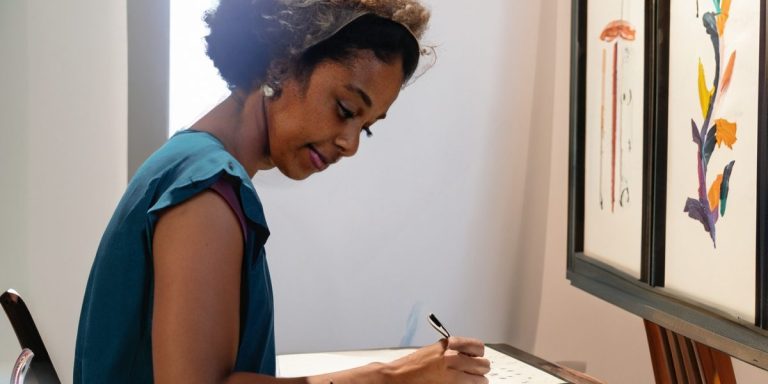Author Biachi N. A. (centre) at Calabar Poetry Festival, 2019
BIACHI NDIDI ANOINTING
On my way back from the Calabar Poetry Festival in December 2019, I experienced some interesting things on the bus I boarded. The first was a young woman, maybe thirty years old—she seemed to have married in her late teenage years. She was with her husband and three children. Her eldest child was seven or eight; I don’t think he exceeded ten. The only woman with children, she was sensitive that we, the ladies, were young and presumably unmarried. I perceived in her an air of supposed superiority whenever she looked at us with a smirk on her face. The first words, after we were led in prayers for a safe journey, came from my mouth.
“Madam, why not give him leather to throw up in?”
The woman held her son’s mouth, compelling him to swallow his vomit. This time, her eyes did not show that glory of being married but a disdainful look, that can only be appropriately explained in Nigerian Pidgin English: “Dey your dey, aunty.” So I quickly averted my eyes from the sight. Few minutes on and still in Calabar, the lad threw up all over the vehicle. For the first time, I was grateful I was late to a bus park, for the woman who sat close to them received an adult baptism of puke.
Biachi Ndidi Anointing
I was pressed even before the bus left the park but for want of a decent place to attend to my pressing matter, I held my piss. This is a trick in Nigerian bus travelling: passengers need to pee badly but don’t have the courage to ask the driver to stop, so they wait for relief when someone else makes the announcement. I eyed the children on the bus and wondered when they’d demand to pee. Alas, a father started ranting to our heedless driver: “Driver, I say stop. My pikin wan piss. Stop or she go piss for your motor.” The bus stopped and I was freed from three hours of holding the valve on my bladder.
We all stepped down from the bus to ease our pees. We, the unmarried women, took the same side of the bush. We freed ourselves and complained about the woman on the bus, how she was unprepared for travelling with children and how her countenance turned people away from helping her. I did not blame her for her attitude; we must have appeared inexperienced to talk to her.
An incidence involving a passenger, his son, and an Immigrations officers broke the silence that had followed us in the bus till that moment, everyone began to talk and somehow gender crawled in and screamed for its audiences.
One of the male passengers noted that the Immigrations officer was not gender sensitive because he did not ask the married woman for her children’s birth certificates but asked another man in the back for his son’s birth certificate. We waited for a response from the married woman and her lips sprung forth a smile. Her eyes glowed and blinked ceremoniously. “They look like me and my husband,” she said.
“But look, his son looks perfectly like him!” The guy who questioned the Immigrations officer continued, in defence of the passenger who was asked for his son’s birth certificate. The passenger was offended: he had shown the birth certificate and told the age of the boy, which the officer disputed. Sometimes kids leap to the defence of their parents but this boy was mute the whole time. So I asked in the little Hausa I spoke if the boy could speak English and his father said no. The boy also replied in Hausa that he did not understand English, but this was his father. After minutes of begging and explanations from the good passengers, everything was resolved. The next thing the boy’s father said after the quiet was that it was because he was from the north that that altercation happened—and another uprising began.
Unmarried as we were, we remained mute until one of the passengers said women are special and shouldn’t do things like drink and smoke. This started another magana. A lady behind me said such statements are used to cage women. This led to the topic of sexual freedom. I alighted from that bus with so many stories but more of hunger and dizziness from my inability to eat because of the boy’s puking episodes that only ended in Makurdi.
Author (R)
* * *
For days now since the lockdown, I have woken up with thoughts that scare me. The usual therapy that worked for me has been tried but nothing has changed. Last night, it rained; I stepped into it several times to baptise myself in the cold water but my soul wasn’t saved. Today, I woke up with the taste of my listlessness on my tongue. I named my fears into simpler things, like a university course of four years that has taken five years due to ASUU strikes, now I don’t know if there is hope to graduate this year because of the Coronavirus pandemic; my house rent expires this month; loneliness, desire to travel, cancelled plans, all choke me. I need a therapy I am still looking for but not certain what it is; I need some kind of closure; I want to free myself from the withheld words that struggle in the same place with the air I breathe■
Makurdi
5th April 2020
Biachi Ndidi Anointing is a poet who writes nonfiction in her leisure time. Her poetry captures the plight of the downtrodden female gender and human emotional situations. She is also an award-winning poet, of the Poets Island 2018 competition. She is a member of SEVHAGE Watch and a teammate of SEVHAGE Literary and Development Initiative. Her poems have appeared in River City Journal.

